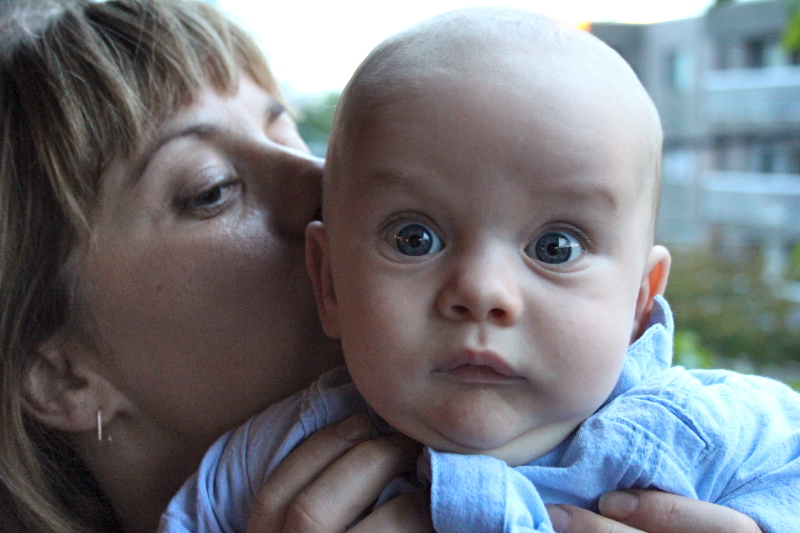Dear Son
Dear Son,
I write a lot about you on the Internet, or to be more specific; my experience with having you. I hope this doesn’t fuck with your popularity or self esteem later in life, but for my job I’m constantly swaying between protecting you and being myself. There are things I want to hide from my kids, thoughts I’ve had that may hurt you- but then there is also my passion. This is what I do for a living son; I’m the raconteuse who is known for her heavy honesty. I’m fucking harsh.
I never mean to be cruel but I tell the truth and the truth sometimes hurts. My husband doesn’t let me post pictures of you on Facebook. He thinks that you should be the one to decide what personal content you share on the web. I’m a bit less generous. I think I made you, you are my cells and flesh, you radically altered my life and it’s my right to talk about it. I also secretly think the “web” might not exist in the way we know it in 10 years so…none of this shit will really matter and we’ll all have chips implanted anyway…but I digress.
If you find yourself creeping on mama’s art when you are old enough to read some of the stuff I have written about you in the past might make you think I was not very grateful for you or that you made life more difficult for me. I don’t want to get too “mother love” about the whole thing but the truth is that my relationship to my art has gotten better since you’ve been here. I pick and choose my contracts with discernment. I set clear boundaries about what I can and cannot do and when I have an idea I run with it. I see a spark. I light it. I burn that shit out of it. I turn the embers into something and then I get to go home.
And that’s where I love to be; home with you. But if I’m going to be honest here, it’s kinda because I’ve been away for the day.
I’ve tried it, staying at home full time for a while and things went sideways quickly. I just couldn’t seem to enjoy you. I was looking for things to do, dishes, and laundry; try to burn through a few emails while you slept. Everything was parceled into compartments of time that I had to get through. We had some fun, we did our best and you were a very happy little boy, comfortable with yourself and sturdy. You’d fall off a chair, smash your head and keep going. You’d run laps around the room, take a break at the kiddy piano to bust out some improvised jazz, toddle over to me and smash me in the face with a heavy object, scream a bit because it felt good and then return to the laps. You are also very funny and you know it. But I was not very “inspired” by it all.
In fact, I went on pills to cope. But then, when we’d make it to the end of the day and you’d fall asleep with your back tucked into my belly and I’d feel your ribs breathing into my breasts I’d think, if someone misses this, this exact moment in life, if you don’t get to have this feeling, you are living with a hole my friend. Cause this tiny shit, this golden ball, cuddled all into me and loving me like this. This is incredible.
And then I’d remember I’d have to do it all again tomorrow…and the weight would start crushing me.
So I started to think that I might love my work more.
I mean, not really; like if work and my son were hanging from a burning building- for sure I’d save my kid- but I do love my boy better and easier when I get to love my work too.
I’ve thought I must be a workaholic (probably am a bit) who’s gotta get it under control or an action addict who is damaging the most precious years of his development or maybe just a woman with her ego out of control because from what I was seeing around me, I should want to be at home with my kid more.
But I don’t, so I hire a babysitter and pay them more than I make to care for you so that I can go make art. And I get some good shit done, I’m useful, I’m ashamed, I make interesting things happen in the world, I don’t, I stay sane, I’m guilty; and then I come home after a long day and I see you at the top of the stairs behind the metal grate that protects you from falling, and we play the lion game- with me in the cage roaring to get out and you put your arms up and we hug tight.
I want you to find your thing my son; the thing that makes you want to do it almost more than you want to do anything else. And then stick to that thing almost at all costs. Do your thing and teach your children to find their thing too. You are lucky; very privileged in fact, to get to do your thing so don’t disrespect it; it’s not selfish and it’s not a luxury. It might mean you are busy more than you’d like to be and it will fucking hurt when your kid cries for you not to leave and you go anyway. But when you get home and you’re actually happy to be there- you’ll realize it’s your duty.
You are in the crib beside me right now. I can hear your breathing. I’m writing about you again and it’s going to pay me about $50 and I feel good. Afterwards I’m going to sneak outside for a secret cigarette (don’t tell your brother when he’s born because he might blame me for his asthma) and then I’m going to bed.
I love you; and when you are old enough to get all this bullshit I’ll know I did my job right if you are too busy to read any of it, and it’ll break my heart a bit but I’ll get it, because you’ll be out doing your thing.
Mom
Means of (re)production
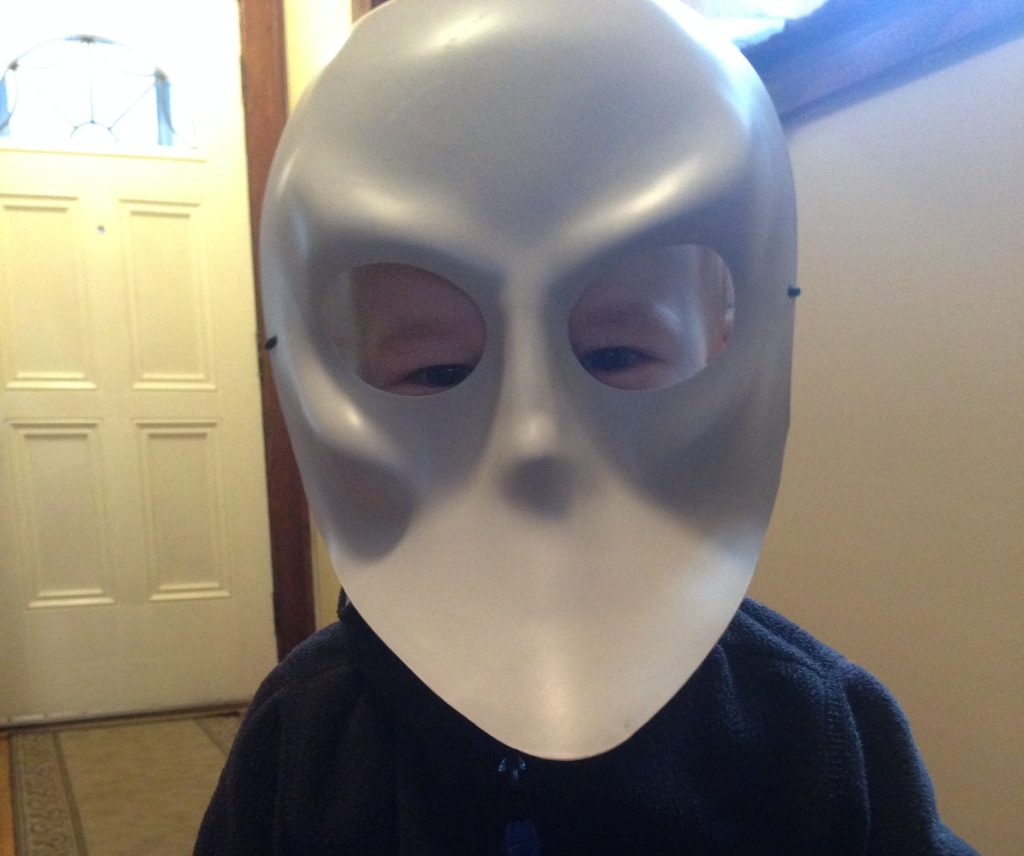
I figured out I was pregnant with our second kid in April 2014. Estimated due date: December 2, 2014. The countdown was on.
After the initial elation subsided, an unexpected depression set in. One night, amid the funk, my partner Nathan said, “you can still be an artist.”
Like the best collaborators, he had put words to the crisis I couldn’t name. I was so tired already, so stretched by my roles as parent, partner, artist. Getting work done was just starting to get a teensy bit easier. Our first child was 18-months and becoming more independent week by week. Our family seemed to have struck a balance between work hours and childcare; art-making and child-rearing. We were sleeping. The prospect of re-entering the chaos of the early infant stages was daunting.
Things are just starting to cook for me in my artistic practice. Am I sabotaging myself, interrupting my flow, disrupting a promising career arc? I need to find new constellations to help navigate these next few years. I wish for pre-baby clarity of mind, but bumble forward with what feels like short-term brain damage brought on by too many Cheerios and too little sleep.
Before having kids I had the privilege of watching some exceptional artists balance parenthood and art-making. Many in Vancouver’s indie theatre scene have kids. In the early days of Neworld (before I came on board) the Leaky Heaven Circus started as a creation project for artists and their kids (and dogs – but that’s a different story).
As an emerging artist working with numerous companies, I observed differences between those run by childless artists versus those run by parents. Everyone worked hard, but in the companies with parents, the work conditions felt more generous. Often it meant that folks were more upfront about their scheduling needs and boundaries. Sometimes that meant that hours of work were adjusted to accommodate the families; sometimes that meant that children were present onsite or even in the rehearsal room.
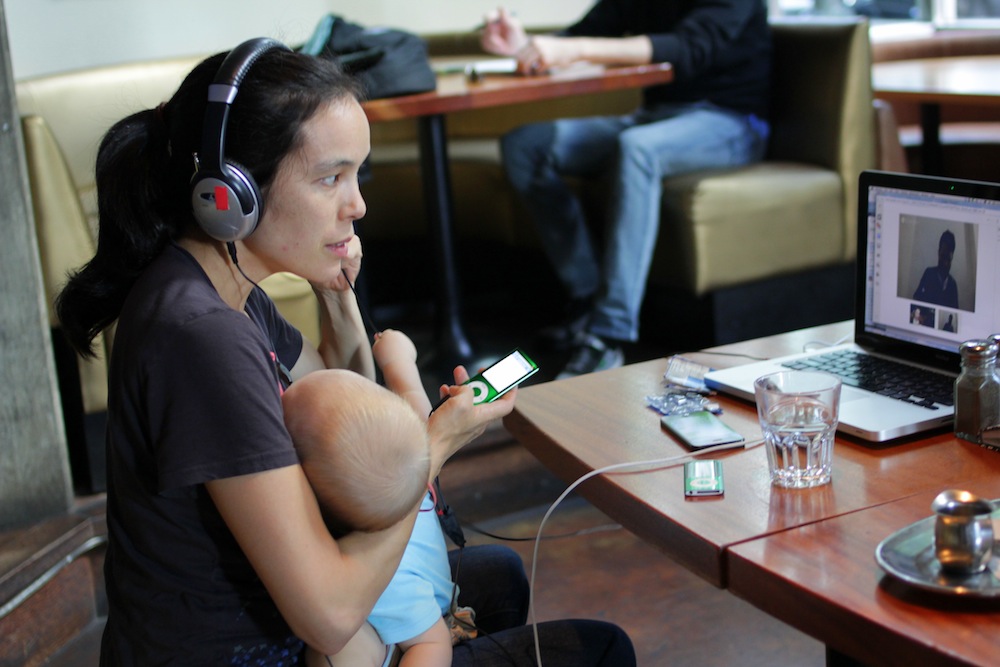
The family-friendly working model put more pressure on the unattached or childless company members. I’ve been that person, too. For many, many years I was the ‘SINK’ in the office – single income no kids. I worked with folks who had children ranging from twos to tweens to teens. Meetings ended at 2:45pm so kids could be picked up from school. Meetings were postponed because kids got sick. Or sick kids coughed and wheezed in the next room while points were quickly ticked off the agenda. Inevitably, if tasks fell after hours or on the weekends, they fell to me.
And now it’s me asking my colleagues and collaborators to plan meetings based on naptimes and child care. And I’m the one showing up tired and distracted.
My training and practice in theatre help me parent. Everyday I use the secrets of the trade. How is it possible to read the same book over and over and over again? Acting training… and maybe having dabbled in durational theatre. Gotta get a baby in or out of your back-pack carrier? Call on the principles of contact improv you learned in movement class!
Working in theatre taught me how to communicate, to have difficult conversations and to collaborate – skills I use with my partner as we figure out what parenting means for us. Theatre also taught me to improvise, to empathize, to employ modes of communication beyond language, to be present in the moment – all of these have helped me to decode my child’s needs and wants. Being at home with a small child can sometimes be mind-numbingly boring. On those interminable afternoons, I’m grateful for the hours I’ve spent in a rehearsal room or in tech waiting. Just… waiting…
My hope is that being a parent is helping to make me into a better theatre-maker. I keep a notebook of ideas for shows and installations. There’s no way I’ll ever be able to produce all these projects, but the ideas keep coming. These past two years have been deeply creative. Never had so many ideas! But never so little capacity to execute them.
I have zero desire to perform for strangers right now. I spend all day performing various, elaborate scenes for an audience of one. I ponder and research and design experiences for my son with the same care and precision that I do my other work. In some ways it is easier to create performances for him, because the answer to the creator’s question, “What do you want the audience to come away with?” is very clear. I want the audience to have a full stomach, or a clean diaper, or a sense of accomplishment, or to be asleep. (For 12 hours, no intermission.)
With each day crammed full of activities and tasks that I move between without pause, my artistic process has necessarily slowed down. The projects I’m working on now I started at least a year before my first was born. But I like living with the ideas for longer.
This all seems possible because of the privileges I have. I am not freelancing or dependent on gigs to pay rent. And I work with an amazing group of colleagues and collaborators who support the variety of needs we all have while participating in a creation process.
Moreover, these colleagues and I have control over our means of production: we are the means of production. We have the ability to adjust timelines and meetings to accommodate due dates, parental leaves, illnesses and naps. These are the gifts that we can give each other when we recognize, collectively, that we don’t need to adhere to standard models of scheduling or rehearsal – models that have more to do with industrial production than the creation of art.
And the works of art that have really affected me reflect and relate to lived experience, they draw attention to the messiness of life. Nothing has made me feel more alive than being a parent, with all its wildness and unpredictability and body fluids. Right now, this is it: this is the place from which I work. Surrounded by used tissues and plastic dinosaurs, by half-read books and interrupted thoughts, and the unbearable sweetness of peanut butter smooches drying on my cheek.
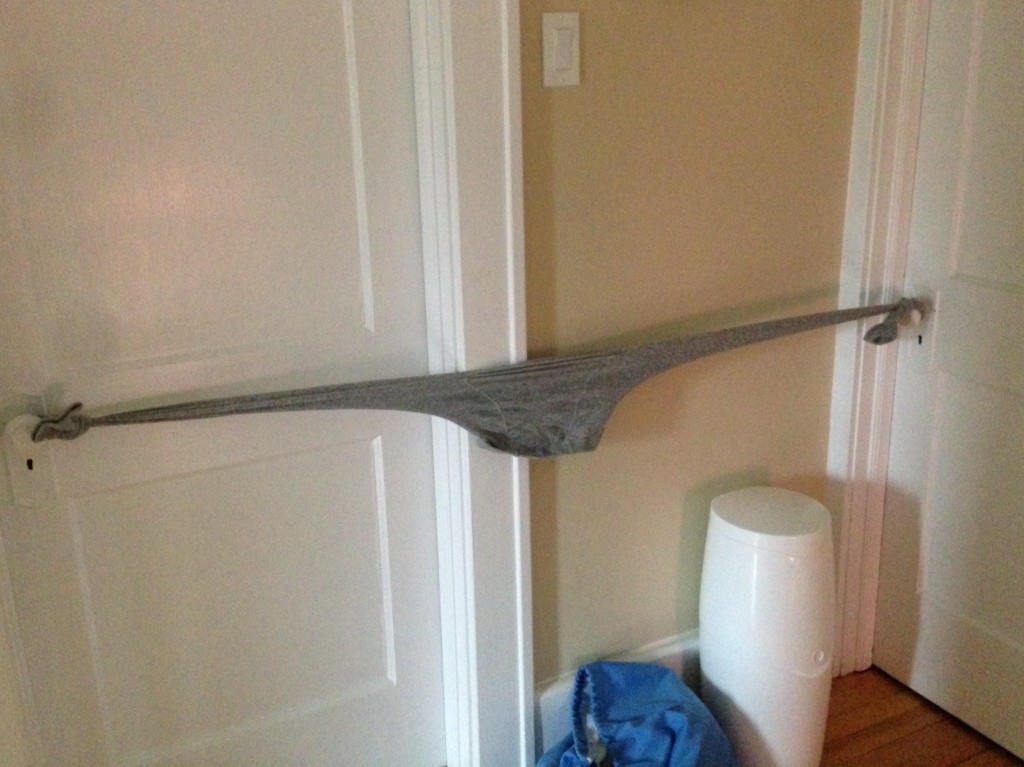
Designers, diapers and drama
Design in Canadian theatre is often incredibly rewarding: full of joy and fun, powerfully moving, collaborative and rewarding, frustrating, stressful, time destroying, damaging to your savings, your home, your lifestyle, your relationship … no wait that’s being a parent…no wait…what was the question again?!
The greatest production of my and my wife Beth‘s lives is our son Aaron. He is an amazing soul who nurtures every aspect of our life and our creativity. He also makes it impossible to get anything done…I am not the first parent or artist to feel this way and I can guarantee I will not be the last.
As an artist I used to define myself through my work. I do video for theatre and therefore that’s who I am; Ben the video guy. However two and half years ago all that changed. I am now Aaron’s dad Ben; I sometimes do video for theatre.
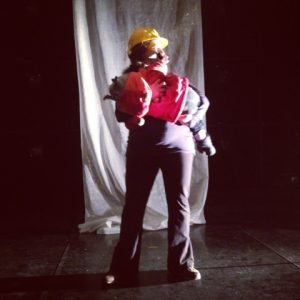 I stay at home with my son while Beth works on shows and hopefully that doesn’t overlap with Shows that I may be doing. We also are a team design firm so we work together on projects, which sounds great and collaborative and it is. However design in Canadian theatre isn’t a part time job. It doesn’t work in shifts. Tech weeks are 16 hours a day or more. Designing takes more time than is ever put on paper and time is a commodity an artist and a parent do not have enough of. As a freelancer you have to take on as much work as you can, and as a parent you feel that sting harder if you over book or don’t book enough. Don’t even get me started on out of town gigs.
I stay at home with my son while Beth works on shows and hopefully that doesn’t overlap with Shows that I may be doing. We also are a team design firm so we work together on projects, which sounds great and collaborative and it is. However design in Canadian theatre isn’t a part time job. It doesn’t work in shifts. Tech weeks are 16 hours a day or more. Designing takes more time than is ever put on paper and time is a commodity an artist and a parent do not have enough of. As a freelancer you have to take on as much work as you can, and as a parent you feel that sting harder if you over book or don’t book enough. Don’t even get me started on out of town gigs.
How do we do it? With volatile schedules and 16 hour day work days, ‘Daycare’ in the traditional sense doesn’t work for us. So we do our best not to double book gigs. We try not to have overlapping projects and we use Babysitters! Lots and lots of baby sitters. We hire, mostly, young actors to watch Aaron as well as some help from my in-laws. We spend as much time looking for sitters as we do conceiving ideas for shows, at least that’s how it feels.
We also bring Aaron to theatre. There is nothing better on a long tech day than seeing your child’s smiling face at the dinner break. It’s even better when they run and hug you. It puts into perspective your time and what it really means. Maybe you can’t fix that cue on dinner break. Maybe you need to nurture someone who in turn will nurture you. Aaron has been in theatre since he was 4 months old. We feel it’s important for him to understand what it is we do. There is no particular agenda with bringing him, we just wish to share with him our appreciation for art and the creative process.
Aaron loves it too. He plays with model maquette pieces at home. He makes stages out of everything. He has toy music instruments and plays them and dances on “Stage”. He then does curtain calls and says “Thank You. Thank You very much” as he bows. He recently has taken to using the voice of god mic to give direction. Hilarious when it happens but terrifying to think he might, “gasp “ go into the theatre. Our on going joke is he can be the best director, drummer, dancer, actor he wants to be … at the hospital talent show when he is head of Cardiology at Mt. Sinai. His parents need him to have a good job because lord knows we don’t have a retirement plan.
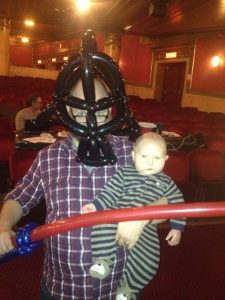 Beth and I founded the Facebook group Class of 2030 as we found ourselves in a huge cohort of artists all in the same age range with kids all in the same age range. (These kids will graduate High School in the 2030’s, which is a number I cannot even wrap my head around.) This group was created to share tips and tricks, babysitter information, things to do in cities where you are working etc. It’s a great resource and has helped many people out. It has helped build community for us as parents and as artists.
Beth and I founded the Facebook group Class of 2030 as we found ourselves in a huge cohort of artists all in the same age range with kids all in the same age range. (These kids will graduate High School in the 2030’s, which is a number I cannot even wrap my head around.) This group was created to share tips and tricks, babysitter information, things to do in cities where you are working etc. It’s a great resource and has helped many people out. It has helped build community for us as parents and as artists.
Community was in part what brought us into the theatre in first place. Misfits, Artsy types and drama queens from High school drama class grew up and got jobs in the professional theatre. Drama classes were, for many of us, the place where we felt part of something and putting on a show was as much for our souls as it was for the audience’s souls. That feeling was nurtured by theatre school, college or university and by our first Fringe and similar festivals.
The Drama classroom was replaced by the beer tent or local theatre bar. Now its the local playground, museum, playgroup and, music class. Communities grow from shared experience. As in all communities there are a variety of opinions and experiences to learn from and we encourage all members to be open minded and non judgmental of each other and to pass on what they feel will help someone else.
The old adage “it takes a village to raise a child” applies to arts communities as well. I highly encourage theatres to continue to provide childcare during matinees or even evening shows. Crying rooms in some theatres are a fantastic idea. It works for faith based communities, and encourages more participation, so why not use it to sell tickets? It’s better to provide options for audience members than roadblocks. Theatres could assist artists with young families to continue to work. Longer rehearsal periods, tech with shorter days and childcare during tech and previews are all possible. Better incorporation of our families into our creative practice will only grow and encourage our community not harm it.
#CdnCult Times; Volume 4, Edition 3
Designer Ben Chaisson with son Aaron in rehearsal
I don’t have any kids. Yet. Hopefully I will one day. Other friends have opted not to. And there are many, very good reasons for making that decision – not the least of which concerns whether adding more lives to this severely challenged ecosystem is particularly wise.
Regardless, being 37, I am surrounded by colleagues and friends who are re-imagining their lives and artistic practices as they bring tiny people into the world. It has helped me imagine what it might mean for myself, and raised compelling questions about inclusiveness and gender equality in our sector. It’s worth considering that even a National Daycare Plan would not be that useful to parent-artists in tech, actors performing at night, etc.
These articles share ‘parenting in the theatre’ experiences in an honest and reflective manner that speaks cumulatively to a desire for more integration and/or understanding in an industry where we already make our own rules and schedules. This I can get behind.
Michael Wheeler
Editor-in-Chief: #CdnCult Times
Burning Vision
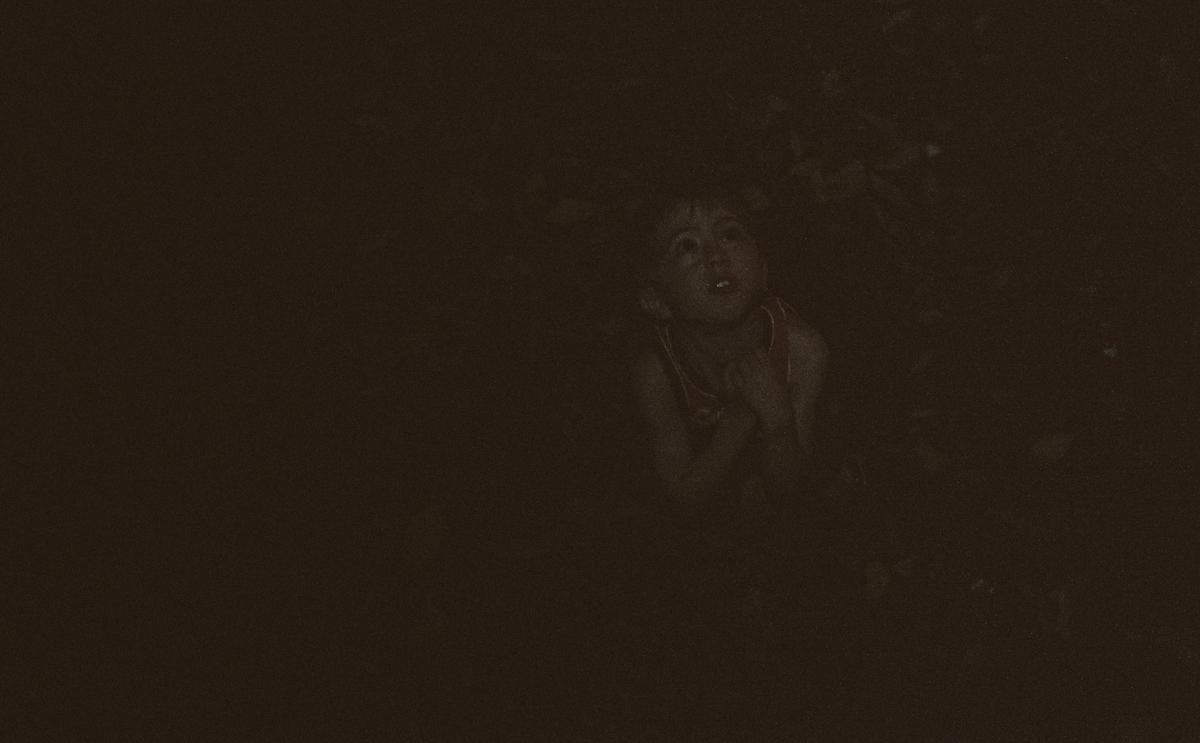
Play: Burning Vision || Playwright: Marie Clements
Shoot: Pointe St. Charles || Models: Charles Blais
LITTLE BOY: Every child is scared of the dark, not because it is dark but because they know sooner, or later, they will be discovered. It is only a matter of time… before someone discovers you and claims you for themselves. Claims you are theirs because they were the first to find you, and lay claim on you…Not knowing you’ve known yourself for thousands of years. Not knowing you are not the monster.
Burning Vision was commissioned by Rumble Theatre and developed in partnership with Playwrights Workshop Montréal
From Where I Stand: Alexandra Lord
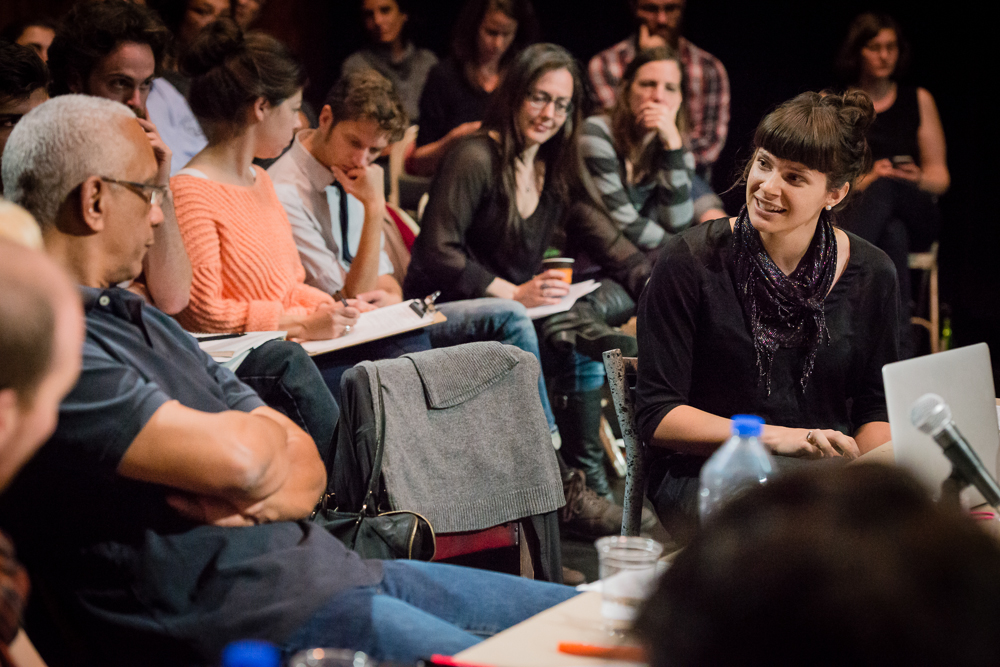
The question of finding the time to define the future of theatre while being deeply immersed in making theatre was one of the main questions on my mind during the conference From Where I Stand: Canadian Theatre in Context this past weekend. I was glad to take a break from my many school projects to join in on this reflection of Canadian theatre history in conversation with other students and invited theatre practitioners from across the country.
The conference was opened with a wine and cheese Friday night. While waiting for Sarah Stanley’s keynote address I took a moment to look around me and acknowledge some of the most inspiring performers, technicians, managers, designers, writers and directors that I have ever met. I took Sarah’s guidance to heart. She said, in this country we should always act like we will meet again because Canadian theatre is still that small. While at the school it is easy to focus on our individual experiences determined by our specific program demands, I think it is essential that we bear witness to our parallel artistic development and how they differ from
program to program. After all once we move past these walls we will inevitably meet again so why not start getting to know each other as best we can now?
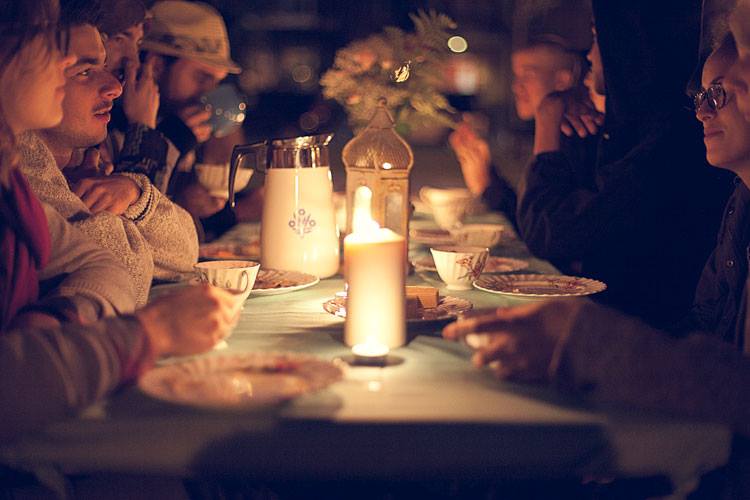
With just enough time to digest I joined my fellow students for a main course of theatre wisdom at the long table discussion on Saturday morning. Listening to all of the contributors define where they stand as being build from where they came from got me thinking about my own roots. I was brought straight back to summers savouring local stories at 4th Line Theatre. Being a small-town girl from central Ontario is one of the many lenses through which I experience theatre. As my focus has expanded past that I have often wondered if I could return and if so what that place would have to offer me now? After so much time away from home the more important question is, is there something relevant I could offer in return?
I left the farm to get a taste of the theatre scene in Toronto. The most nourishing experience was interning with the education outreach department at Soulpepper Theatre, facilitating story-telling workshops with youth with little-to-no previous theatre experience. Since I have been in Montreal my time has been more focused on my own personal artistic development with less energy to dedicate to community outreach. Which is why Annabel Soutar’s statement about theatre as a niche community that only speaks to itself really touched me. This movement from
a one-sided artistic monologue to a dialogue with non-theatre makers is what I think is really important in our active re-imagining of what theatre can be in the future. I truly believe that this should be part of our education at every stage in our development.
Another particular lens of mine that I would like to expose is that the last three years of my life have been spent in another dialogue, constantly in translation. The costume and set design program is the only bilingual program at the school in one of the only bilingual cities in Canada. Montreal has offered me a whole new palette to create from which has relied on a constant dialogue over difference which I think is essential in understanding the future of Canadian theatre. From where I stand, on my way out the door of NTS, I hope to continue having these conversations from different perspectives exposing not only the contrast between
anglophone and francophone theatre in Canada but also posing an inquiry into all other conflicting national narratives. Such as questioning why indigenous theatre in Canada has been pushed past the fringes of the festival circuit of our own country, finding a more engaged audience in the international scene.
If we take the time to gather like this more often, the question of what theatre in the future will be becomes much easier to swallow. I have no idea if I will be returning home after I graduate, working in a professional or educational context or in which language or culture I will be immersed. But I do know that wherever I end up I will be collaborating within a community.
We will be actively engaging in the future together not only through the work we do but equally through the conversations we have about the relevancy of this work. We have to continue taking time outside of our busy schedules to reflect on the theatre we are so busy making. If we can continue to come together, despite distance or difference, we will be able to share this experience of re-imagining Canadian theatre, one small bite at a time.
From Where I Stand: Annabel Soutar
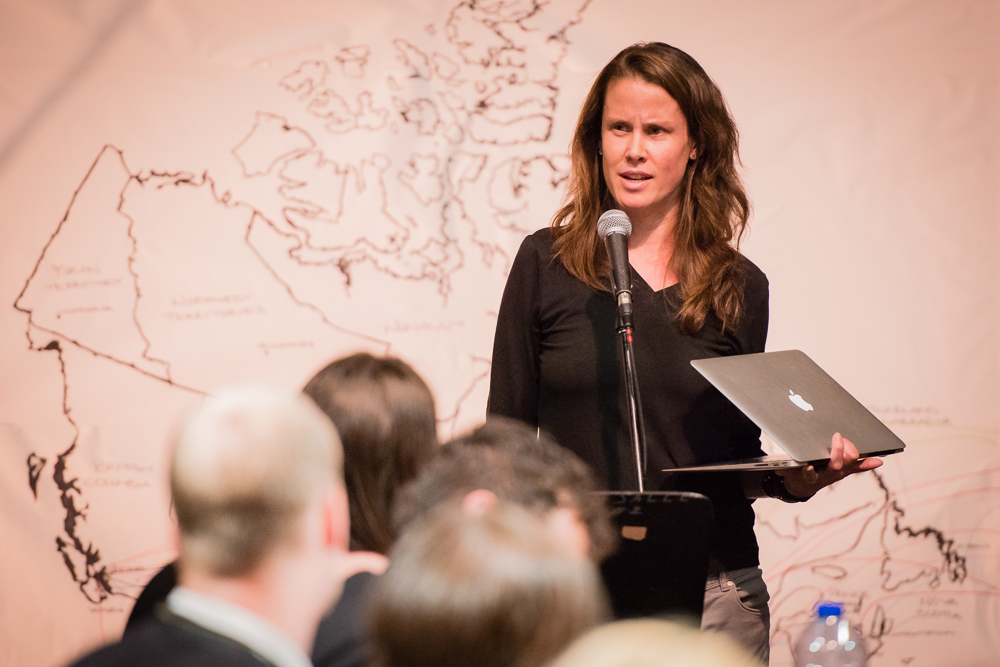
7 things I see about theatre and Canada, and about theatre in Canada.
1. Canada seems to be deeply divided ideologically today. This might be an imaginary perspective nourished by the mainstream media to keep us interested in stories about politics in our country. My experience travelling around Canada is that people share a lot of common ground but rarely have enough contact with one another to express that common ground.
2. Theatre is underfunded, under attended, and under practiced in Canada – which is weird because if there is one medium that can re-align imaginary narratives, it is the theatre. I want to accelerate misaligned narratives through the work I do making documentary plays.
3. Collective impact is a big buzzword in Canada right now. We need to do things together but we are so segregated into professional, ideological and cultural silos. We need to build a common narrative in Canada, a national story. This common narrative should not be confused with patriotism. It should be conceived as a story about diverse people learning how to talk with each other again to tackle common challenges; building new language that doesn’t immediately try to force consensus but that allows for dissidence, dissonance, awkwardness, uncertainty, failure to connect as a process through which we have to pass to find connection again. It is a story that takes the conversation away from the experts and gives it back to the citizen – the true power behind Canada’s democracy. Democracy, as managed by political experts, is a farce right now in Canada if we judge it by the conversation that is taking place in the House of Commons.
4. Theatre of the citizen is not simply political theatre. It is deeply personal. Because none of us lives alone. We make political decisions every day in the way we speak to people, the way we spend our money, the way we raise our kids, the way we care for our parents. Politics is not reading the newspaper and being up on political affairs or deciding to become an MP, or starting an NGO, or declaring that you are apolitical. It is a conversation we have with one another in order to share the planet as gracefully as possible. The lack of grace today in political dialogue is a symptom of this abuse of the true definition of politics. The theatre is a medium that can and should attempt to inject some grace back into political dialogue.
5. I am not trying to make a point (right now) or when I write a play. I am trying to start a conversation. The conversation is about: why are we behaving this way in Canada today? Character is what character does. What Canada does today is Canada’s character. We have to put that character on stage so people can see it. Because it’s quite a crazy picture. It’s also very funny and entertaining and can sell a lot of theatre tickets and maybe even some merchandise.
6. Theatre artists are amongst the most brilliant people in Canada but they are generally destitute and marginalized. Why is this? We should be leading our country, not just observing it.
7. Theatre is serving a cultural elite and is not generally considered relevant to people working in other professions. Why are we theatre artists talking just to ourselves? What’s the point? How can we integrate theatre back into the fabric of day-to-day life for people? Are we afraid to reach outside our black boxes to participate in other arenas? Are we prepared to use our skills to serve society in a different way?
From Where We Stand: Carly Chamberlain & Tanya Rintoul
National Theatre School Directors and guest editors of this volume of the SpiderWebShow Carly Chamberlain and Tanya Rintoul, reflect on last weekend’s conference while eating sushi at their desks and pretending they are in separate rooms.

So. Let’s talk about this thing we organized a couple weeks ago!

it was really only one week and two days ago

I have no idea what day it is right now.
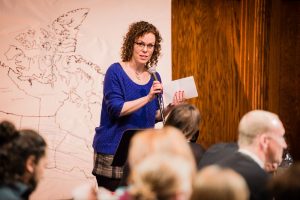
All I know is that it happened.
The long table portion of the day was suuuuper interesting: engaging, contentious, funny and frustrating, covering lots of big questions…. I had to go back today to remember what the initial question Sarah started us off with was. And now that I have, I’m interested to see what our responses would’ve been had we not been diligently live-tweeting!
So: If you could change anything about how you’re living your life today what would it be?

I would have exercised today.
But, seriously…
I would be more aware of the world. Of the things that indirectly affect me. I have avoided those things for a long time. Especially political things, because often the uncertainty of what the truths are really overwhelm me.
How about you?

I’m always thinking about changing my relationship to fear. It’s evolving…but slowly. I feel like I have to constantly practice the habit of running face first into the things (both creatively and personally) that freak me the fuck out. And every time I think I’m getting better at it, something new and scary presents itself.

I relate to that too. I think that’s a big part of engaging with change, and as artists we do that everyday (even when we don’t read the newspaper)
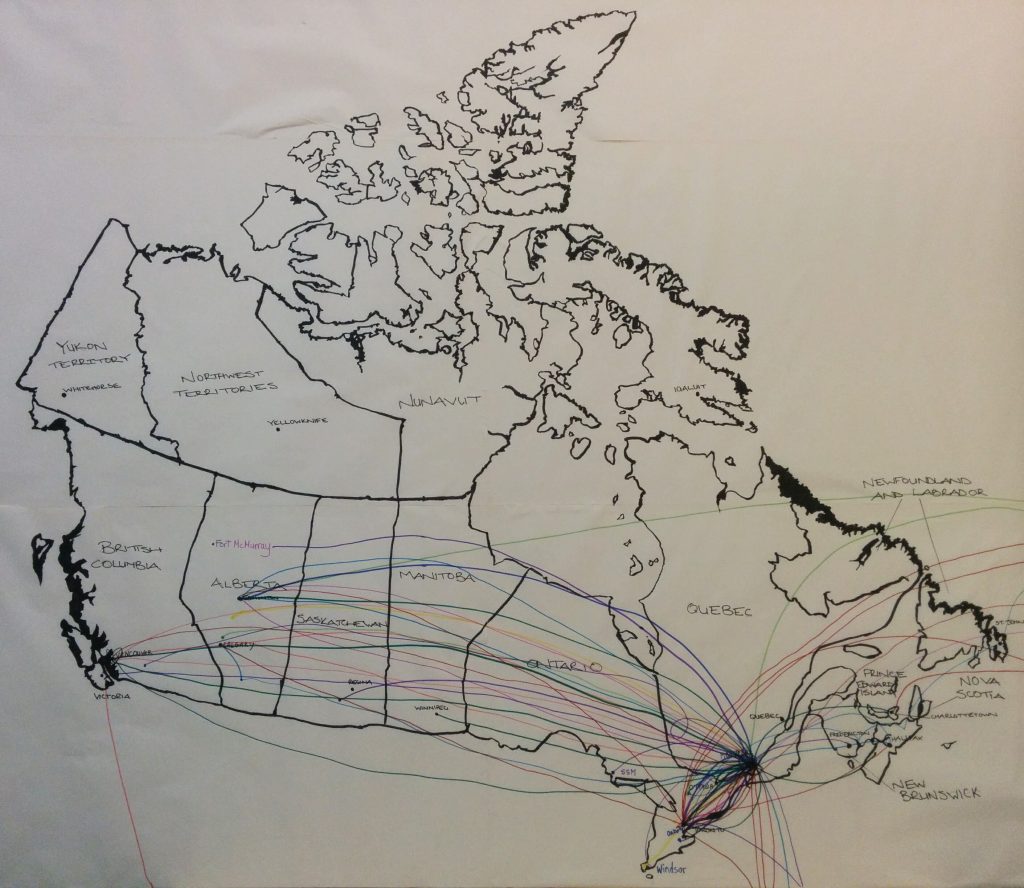

One of the very first things that was said during the morning that really stuck with me, was when Sarah (Garton Stanley) said, “We feel as citizens and respond as artists”. That seemed to be a recurring theme throughout the conference.

Absolutely. It is such a wonderful framework. One that I honestly hadn’t considered before, in those specific terms. I think identity outside of being an artist is something that I often struggle to name.

ooh yeah that’s a big challenge and question as (relatively) young artists. Which came first our identities as artists? or citizens? or women? etc…- I feel like coming back to school and taking a break from creating (while working a million joe jobs) has started to open up the conversation with myself about WHY I create, and for whom, and why this medium…

‘Why’ is such a big question. When it comes down to it there are so many reasons, and so many definitions of those reasons. For example the discussion at the long table about who our work is for. Who is it serving?
We talked a lot about community. And how it inspires and impacts what we are saying and doing with our work. This is often challenging for me, as I have never felt a part of a community outside of my artistic one.

Yeah I get that, and I think it’s a super common experience. We spend so much time in theatre schools, and with our collaborators, these super inspiring, but ultimately privileged environments, that I think we all so quickly look inward instead of outward.
But also — what is community?? Especially as a young Canadian??
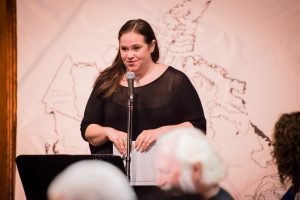

It is hard to look outside that bubble.

hmm. I guess I think of community as some group of people with shared values or backgrounds, something that unites them. but more and more I feel like there are wide gaps between my experience of the world and that of people seemingly similar to me, so how can the work possibly speak to that? But actually, maybe that’s the point — sort of what Annabel Soutar was getting at too – that finding a national narrative isn’t about patriotism or a single voice…but bringing diverse perspectives learning how to talk to each other again
so maybe the artistic work of our generation isn’t about communicating to a single community, but finding ways to connect with differing perspectives
both finding common ground and acknowledging the gaps too

I think acknowledging but also accepting the gaps is crucial. There is a power in having different perspectives in our artistic voices because there is a great tension between ideas that also tells a story. There doesn’t have to be terms of agreement, or a fight to prove that one’s voice is more important or more ‘right’ than another.
We don’t have to agree or even get along.
Like Annabel said “a new language that doesn’t force consensus.”
I wonder though how to begin to form a new language. It feels like a vicious cycle….wouldn’t we have to agree on not agreeing in order to move forward on new terms?
The overall experience of the table was that there were a lot of voices looking for change. But not half as many answers for how.
And I don’t know what that means for the future.

And just like our etiquette for The Long Table….”there is no conclusion”…..
But just because there’s no conclusion doesn’t mean we can’t take our ideas and discussions and put them into action. We don’t need to wait for consensus to change the form of dialogue, we can just do it.
Ok, problem solved. What’s next?






